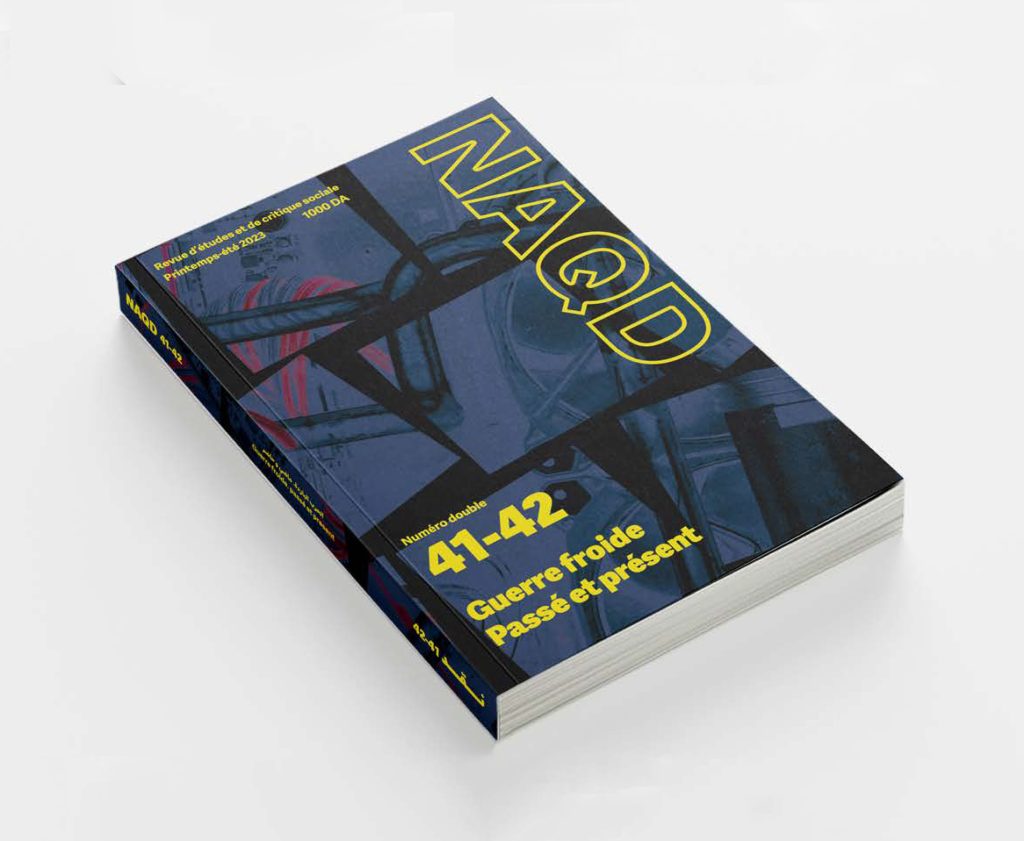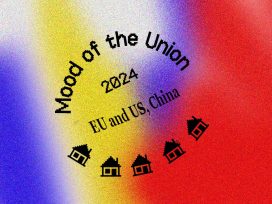Beyond spheres of influence: Cold War histories across four continents, including the bloc confrontation’s origins in Iran and the persistence of anti-communism in Brazil. Also: future scenarios for the Sino-American conflict.
Thirty years after the end of the Cold War, and with a new bipolarity looming, Algerian journal NAQD examines the global impact of the struggle. Authors from seventeen countries and across four continents explore how Cold War tensions pervaded countries beyond the spheres of influence, shaping conflicts and the political and social formations of states, both old and new. The issue also looks ahead, considering the repercussions of a return to bloc politics in the context of war in Ukraine and escalating Sino-American rivalry.

Middle East
How did allies become adversaries? Esmaeil Zeiny finds answers in the secession of the Azerbaijan People’s Government and the Republic of Mahabad from Iran in in 1945. Though these states lasted barely a year, they provoked an international crisis that ‘set the tone of the incipient Cold War’.
Historians disagree over the origins of American-Soviet conflict in Iran, variously blaming the Soviets, Americans and British. But, writes Zeiny, these schools of thought overlook a key factor: ‘the conditions in Iran that gave birth to that confrontation’. He presents the historical context of the rivalry, beginning with Iran’s 1939 declaration of neutrality, which failed to prevent the Allied invasion in 1941. Over the next few years, Iran looked to the US to protect it from the ‘imperialist ambitions of the British and the Soviets’, requested the help of American military and civil advisers, and offered the US an oil concession, in displays of favouritism that enraged the Soviets.
Fearing the growing US influence, the Soviets sowed seeds of rebellion in northern Iran. The ground was fertile, argues Zeiny. Under Shah Mohammad Reza Pahlavi, the Iranian government had mistreated minority populations, trampling on their civil liberties, and imposing economic policies that produced poverty, unemployment and inflation in the region. The ‘sum of these elements made Azerbaijan an ideal place for the propaganda and political penetration of the Soviets’.
Convinced that the uprisings were part of a plan to establish a pro-Soviet regime in Iran, and with the Iranian government again asking for its help, the US opted for a policy of ‘firmness’, which eventually evolved into its strategy of containment.
Latin America
What impact did the Cold War have beyond the spheres of influence? Murilo Leal Pereira Neto describes a phenomenon of ‘Cold War internalization’ that shaped the political and social landscape of Latin America, putting the brakes on rising labour and leftwing movements, and undermining democracy.
Focusing on Brazil, the author examines developments – that threatened to upset the status quo: the emergence of an urban working class, growing nationalism, a thriving economy, demands for civil liberties. Dominant classes and systems in the country resisted these changes, exploiting the political logic of the western bloc that characterized opposition as disloyal and conflated labour movements and unions with the communist threat, portraying them as ‘the enemy within’.
This perspective sheds light on the return of a Cold War climate today, with ‘communist threats in Latin America … and imperialism in Eastern Europe’. Bolsonaro’s campaign ‘drew heavily on the Cold War political imaginary’, writes Leal Pereira Neto, demonizing Venezuela by tracing the regime’s connections to communism and the Worker’s Party in Brazil. As ‘a powerful symbolic system for “organizing” the world and classifying friends and enemies, with the aim of strengthening the power structures in each of the blocs’, Cold War ideology remains a useful tool for politicians seeking to justify repression.
A new Cold War?
Turning to the future, Wojtek Lamentowicz advocates long-term strategic thinking, asserting that leaders can set the course even in rough seas. In his piece on Sino-American rivalry, he analyses four possible scenarios in the run-up to 2049 – China’s deadline for achieving ‘global supremacy’.
These are cooperation, turbulent competition, a new Cold War, and open war. The first, Lamentowicz contends, is improbable: each power will continue to battle for hegemony, only cooperating when it is in their interest. Turbulent competition is more likely: a bipolarity will emerge, but ‘there will be no coordination in this process and no common accord on the fundamental rules of the game’.
Elements of a new Cold War will also appear, lending a ‘more ideological … and militaristic flavour’ to the competition. Finally, open war is likely to be avoided – ‘Xi is clever enough not to repeat Putin’s costly mistake’, and defending Taiwan might be a ‘mission impossible’. This will, however, depend on US willingness to cede its dominance in East Asia.
Lamentowicz concludes with some suggestions: the US should expand and strengthen alliances, particularly in the Asia Pacific and Indian Ocean; develop closer military ties with Vietnam; and, as Biden plans, ‘organize a security cordon around continental China’. Meanwhile, China must avoid the middle-income trap and political backlash at home and abroad. In both countries, beyond population and GDP, other factors will be decisive: productivity, standard of living, and the quality of growth.
Lamentowicz points to a ‘danger inherent in a reversal of the power balance’: the Kindleberger trap. As the USA weakens, China’s capacity and willingness to provide global goods ‘will frame the power struggle between the Eagle and the Dragon’.

This article is published in cooperation with CAIRN International Edition, translated and edited by Cadenza Academic Translations.
Published 3 May 2023
Original in English
First published by Eurozine
Contributed by NAQD © Eurozine
PDF/PRINTIn collaboration with
Newsletter
Subscribe to know what’s worth thinking about.
Related Articles

A changing world
EU, USA, China
From COVID-19 to economic tensions and full-scale war in Ukraine, the relationship between the EU, the US and China has undergone seismic shifts since the last European Parliamentary elections in 2019. This year’s elections on both sides of the Atlantic are likely to alter these dynamics, changing the geopolitical landscape again.

European museums are full of stolen goods. Impressive exhibitions of prized artefacts behind glass testify to the extent of colonial robbery. They also evidence the spoils of earlier imperialism, often depicting acts of conquest. How can previous empires genuinely atone for their abuses of power and truly recognize compromised biographies?





